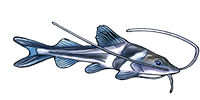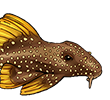Seeing "redtail logsucker" on an Indian import list, I thought I'd educate myself on Garra spp. Browsing through the species on FB, I was impressed by just how cosmopolitan they are, ranging from East Asia across Africa and into Europe. Yet from what little I could tell about appearance, they all look quite similar and share similar habitats (though some are from not fast water). Have there been any recent studies done on the genus? Has its monophyly been established?
The other thing I was wondering about is why when every nasty little fish with a claim to eat algae becomes popular in the aquarium hobby, I have never ever seen Garra for sale? I've often wondered about a good algae eater for an African biotope tank, something to go with Synodontis and Anubias, for example. Garra would seem to make the perfect fit. So why are they virtually unknown in the hobby?
Dinyar
Garra
- Dinyar
- Posts: 1286
- Joined: 31 Dec 2002, 00:34
- My articles: 3
- My images: 226
- My catfish: 10
- My cats species list: 3 (i:10, k:0)
- Spotted: 94
- Location 1: New York, NY, USA
- Interests: Mochokidae, Claroteidae, Bagridae, Malepteruridae, Chacidae, Heteropneustidae, Clariidae, Sisoridae, Loricariiadae
- Silurus
- Posts: 12461
- Joined: 31 Dec 2002, 11:35
- I've donated: $12.00!
- My articles: 55
- My images: 896
- My catfish: 1
- My cats species list: 90 (i:1, k:0)
- Spotted: 428
- Location 1: Singapore
- Location 2: Moderator Emeritus
No, "Garra" is very much a mess, like "Labeo" (another supposedly cosmopolitan genus)Has its monophyly been established?
Garra ceylonensis is regularly available in Singapore. I have not yet seen it in the US, though.I have never ever seen Garra for sale?
They are mostly found in rheophilic habitats that are not well-collected localities for the aquarium trade. Most of them also require cooler water, which makes them more sensitive to shipping.So why are they virtually unknown in the hobby?

- sidguppy
- Posts: 3827
- Joined: 18 Jan 2004, 12:26
- My articles: 1
- My images: 28
- My aquaria list: 5 (i:0)
- Spotted: 9
- Location 1: Southern Netherlands near Belgium
- Location 2: Noord Brabant, Netherlands
- Interests: African catfishes and oddballs, Madagascar cichlids; stoner doom and heavy rock; old school choppers and riding them, fantasy novels, travelling and diving in the tropics and all things nature.
- Contact:
Garra's are hard to get; I see Asian species popping up from time to time, kept a few too.
They're VERY good algae-eaters and continue to be when adult.
However, they're vicious little missiles that can go completely ballistic to each other in a small (less than 2 meters) tank....
Adult Garra's are pretty (almost like some Koi or like big Morulius; with shiny scales and a coppery "sheen"), but a handful too; sturdy tankmates is a must.
Definitely something as a solitaire or with a fairly big group; smaller groups (3-5 etc) definitely won't do.
Only once did I encounter African Garra's; those were in the same shipment as my Amphilius. Unfortunately I didn't have many tanks back then; so I couldn't give them any room.
They were extremely elongated, much more elongated than their stubby Asian counterparts. Apart from that, and a more visible stripe on the flanks, they look very much like those, esp the head.
They originated from Ghana (species?) and very shy, hiding in the corners of a sparsely lit tank; Asians (G "ceylonensis"?) are much bolder in behaviour.
They're VERY good algae-eaters and continue to be when adult.
However, they're vicious little missiles that can go completely ballistic to each other in a small (less than 2 meters) tank....
Adult Garra's are pretty (almost like some Koi or like big Morulius; with shiny scales and a coppery "sheen"), but a handful too; sturdy tankmates is a must.
Definitely something as a solitaire or with a fairly big group; smaller groups (3-5 etc) definitely won't do.
Only once did I encounter African Garra's; those were in the same shipment as my Amphilius. Unfortunately I didn't have many tanks back then; so I couldn't give them any room.
They were extremely elongated, much more elongated than their stubby Asian counterparts. Apart from that, and a more visible stripe on the flanks, they look very much like those, esp the head.
They originated from Ghana (species?) and very shy, hiding in the corners of a sparsely lit tank; Asians (G "ceylonensis"?) are much bolder in behaviour.
Valar Morghulis
- coelacanth
- Posts: 880
- Joined: 31 Dec 2002, 13:19
- My articles: 1
- My images: 2
- My catfish: 4
- My cats species list: 32 (i:0, k:0)
- Spotted: 3
- Location 1: Bolton, UK
- Location 2: UK
- Interests: All things Aquatic




